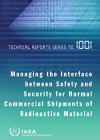Nuclear and other radioactive material is potentially vulnerable to security threats during transport. The IAEA assists states to implement and to maintain a national nuclear security regime for the transport of such material.
Transport security
Assisting its Member States with the security of nuclear and other radioactive material during transport is an important element of the IAEA’s work. While transport safety aims to protect the public from the radioactive contents of a package, the goal of transport security is to guard nuclear and other radioactive material with locks, seals and other technologies and methods to ensure it does not fall into the wrong hands.
These materials are shipped nationally and internationally by road, rail, sea, air and inland waterways for applications such as medicine and health, agriculture, nuclear power generation and advanced scientific research. The IAEA estimates that 20 million shipments of radioactive materials are transported every year. The requirement for transport security is therefore equally vast.
The IAEA assists states with the development of a physical protection regime for the transport of nuclear and other radioactive material to help protect people, property and the environment from malicious acts. This could include, for example, radioactive packages being intercepted or sabotaged during transport.
Security and safety considerations for the transport of radioactive material must work in concert so they are in compliance with transport regulations and other IAEA safety standards and nuclear security guidance.
The Agency and its Member States have developed recommendations and guidance for security purposes, which they regularly update and revise. These documents inform Member States about how to design and implement a robust and sustainable transport security system. In its work, the IAEA pays particular attention that security measures do not compromise safety and vice versa.







